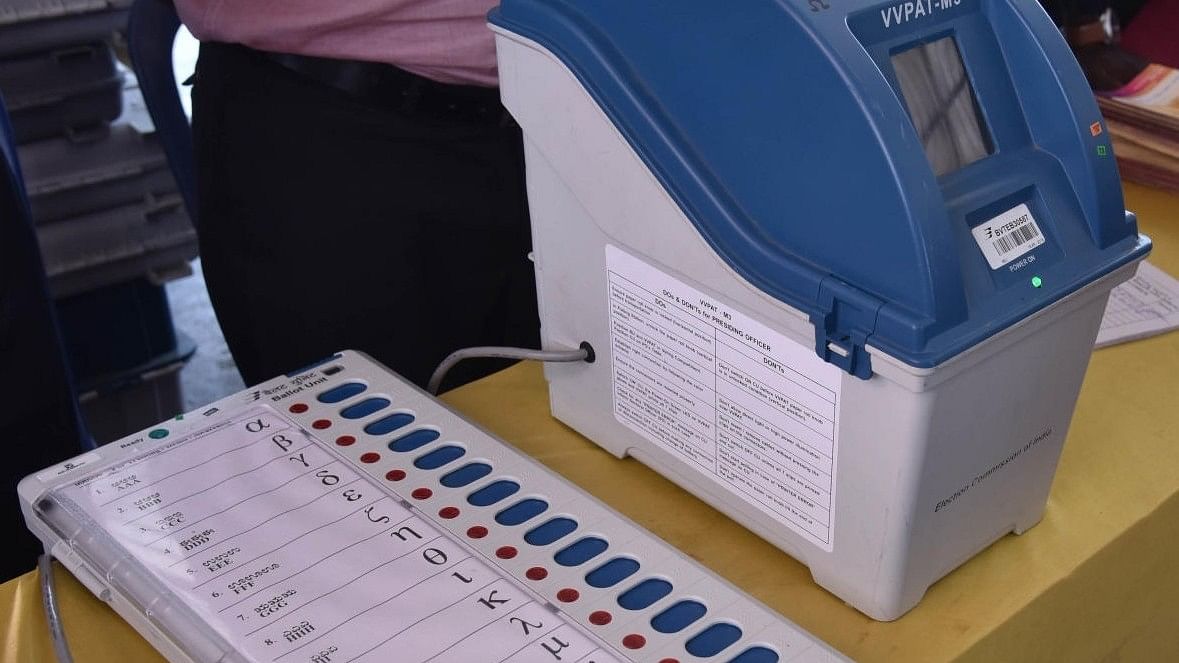
Photo of an EVM with VVPAT.
Credit: DH File Photo/SK Dinesh
The Election Commission of India has told the Supreme Court the 100 per cent verification of VVPAT slips in EVMs was a "regressive thought", and would mean reverting to the old paper ballot system.
It also asserted that there was no "fundamental right" of the voters to verify through VVPATS that their votes had been "recorded as cast" and "counted as recorded".
In an affidavit, the poll panel maintained that the counting of 100 per cent VVPAT slips will be against the spirit of the use of EVM.
The poll panel said that theoretically there may be discrepancy between the EVM count and the VVPAT slips count, but practically there is no possibility of any discrepancy between the EVM count and the VVPAT slips count, except in case of an human error in counting the VVPAT slips.
The EC filed the affidavit in the top court in response to a plea filed by Association of Democratic Reforms (ADR), through advocate Prashant Bhushan, for cross verifying the counts in EVMs with VVPATs (Voter Verifiable Paper Audit Trail) in all polling booths, which is limited to five polling stations per Assembly constituency at present.
"The provisions of the Conduct of Election Rules, 1961 do not violate any fundamental right and in fact the concerned provisions have undergone judicial scrutiny at many occasions and their constitutionality has been upheld time and again," it said, terming the plea by ADR for raising the number of VVPAT verification as "misconceived and devoid of merits".
It said the present petition is yet another attempt to cast doubt over the functioning of EVMs/VVPATS with "vague and baseless grounds".
"The EC anticipates that the present petition casting aspersion over the EVM/VVPAT system will not be the last of such petitions before the Lok Sabha Elections, 2024," the constitutional body said in an affidavit filed on September 4.
In a voluminous 469-page affidavit, the EC through its counsel Amit Sharma said VVPAT is essentially an "audit trail" for the voter to instantaneously verify their votes cast in the ballot unit.
“However, based on the directions of the Apex Court, VVPATS slips are being cross verified on a statistically robust sampling basis. Therefore, to press forward a ground for 100 per cent verification of VVPAT slips is a regressive thought and tantamount only to going back indirectly to the days of manual voting using ballot system,” it said.
It said the ECI-EVM has an inbuilt system of recording each vote (candidate button number pressed by the voter on Ballot Unit) with date and time stamp, which can be retrieved by using decoder or printer (customised) based on orders of the courts.
It said till date ballot slips of 34,680 randomly selected VVPATs have been tallied with the electronic counts of their CUs, and not a single case of transfer of vote meant for candidate ‘A’ to candidate ‘B’ has been detected.
The ECI said it has put in place stringent technical and administrative safeguards for the EVMS so that the machines could not be tampered or manipulated to any extent whatsoever.
“Further, all the election activities related to the EVMS are carried out in the presence of the political parties/candidates in the most transparent manner…..EVMs are totally stand-alone machines having One Time Programmable (OTP) chips. It cannot be hacked or tampered," the affidavit said.
It also stated since the introduction of VVPATs, more than 118 crore voters have cast their votes with full satisfaction and only 25 complaints have been received under Rule 49MA, which were all found to be false.
The ECI said in case of 100 per cent counting of WPAT slips, it may take more time than the time specified for ballot counting.
Moreover, in case of recounting due to recounting demand or any human error the time may be endless, it said.
The plea sought a direction to cross-verify the vote count in EVMs with votes separately “recorded as cast” in the VVPAT and also a declaration that it is the fundamental right of every voter to verify that their vote has been "recorded as cast" and "counted as recorded”.
On Wednesday, a bench led by justice Sanjiv Khanna declined to give an urgent hearing on the petition and scheduled the matter for November.
The bench told Bhushan, “How many times will this issue be raised? Every six months. There is no urgency. We will hear in due course".
The apex court said every year, a fresh petition is filed about this and there are other urgent matters to be considered, and that this was not a criminal case.
Previously, the court had asked Bhushan, “aren’t you being oversuspicious”?
